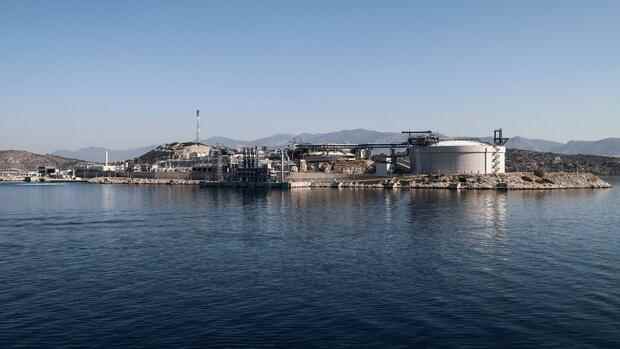Athens Greek Prime Minister Kyriakos Mitsotakis said last December: “Greece has no nuclear power plants, and we will never have any either.” But in order to become less dependent on Russia as a gas supplier, the government in Athens is now rethinking its long-term energy policy strategy.
Nuclear power, which has so far not been part of the Greek energy mix, could play an important role. Greece is currently in talks with neighboring Bulgaria about long-term supply contracts for nuclear power. A first meeting took place last week at Mitsotakis’ headquarters.
Greece has not yet officially announced the talks. But government circles in Athens confirmed to the Handelsblatt: “There are such contacts.” Serbia and North Macedonia have also shown interest in importing electricity from Bulgaria, said Bulgarian Energy Minister Alexander Nikolow this week in parliament in Sofia. This would possibly give Bulgaria the economic basis for the construction and operation of a new nuclear power plant.
Greece currently produces almost half of its electricity in gas-fired power plants. The largest supplier is Russia. 40 to 45 percent of Greek gas imports come from there. The rest comes via pipelines from Azerbaijan and as liquefied natural gas (LNG) from Algeria, Qatar, Egypt and the USA, among others.
Top jobs of the day
Find the best jobs now and
be notified by email.
The Russian state-owned company Gazprom supplies Greece via pipelines that run through the Black Sea, Turkey and Bulgaria. These lines are not directly affected by the war in Ukraine.
Contingency plans for Russian delivery stops
However, the government in Athens has already developed contingency plans in the event that Russia stops supplying gas. The resulting bottleneck is to be compensated for by more deliveries from Azerbaijan and additional LNG imports.
The Greek government plans to shut down all but one of its lignite-fired power plants by 2023.
(Photo: imago images/ANE Edition)
The Greeks are therefore speeding up the expansion of their liquid gas infrastructure. The Gastrade consortium, which is planning an LNG terminal at the northern Greek port of Alexandroupoli, applied to regulators this week for approval for a second facility. This increases the storage capacity of the terminal from the originally planned 170,000 cubic meters of liquid gas to 340,000 cubic meters.
The first construction phase is scheduled to go into operation at the end of 2023. When completed, the terminal will have a capacity for regasified natural gas of 11.6 billion cubic meters per year. In addition to Greece, the Balkan countries can also be supplied with gas from Alexandroupoli.
In addition to the Greek gas supplier Depa and the network operator Desfa, Gastrade’s shareholders are the Bulgarian state-owned Bulgartransgaz, the Greek energy group Copelouzos Group and the shipping company Peter Livano.
The North Macedonian pipeline operator NER is also planning a stake in Gastrade and wants to secure gas from Alexandroupoli with long-term supply contracts. The Greek refinery operator Motor Oil is building another LNG terminal near Corinth.
>>> Read here: EU country Cyprus is itself in trouble as a result of the European sanctions
In addition to the expansion of renewable energy sources, natural gas plays a major role in Greece’s phase-out of coal. The government intends to shut down all but one of the lignite-fired power plants by 2023.
The state electricity supplier DEI intends to convert the last remaining coal-fired power plant to gas in 2025. Even if Greece is still not planning its own nuclear power plants, nuclear power should help the country to achieve its climate goals.
Mitsotakis had already explained in the Handelsblatt interview: “If I look at the entire energy mix in the EU, I cannot see how we want to achieve CO2 neutrality without nuclear power.”
Since then, the war in Ukraine, Western sanctions against Russia and rising prices have shaken the energy market. That will “force everyone to think creatively about nuclear power,” says Prime Minister Mitsotakis.
A Bulgarian delegation led by Finance Minister Assen Vasilev came to Athens last week to discuss opportunities for cooperation in the use of nuclear energy. The plans are still “at a very early stage,” said a government official.
Complicated legal and economic issues
Complicated legal and economic issues need to be clarified, such as the price at which Bulgaria will supply electricity to Greece and the duration of the planned purchase agreements. Finance Minister Wassilew mentioned a possible contract period of 20 years. A prerequisite would be the construction of new high-voltage lines between the two countries.
To date, Bulgaria operates only one nuclear power plant near Kozloduy on the Danube. It went online in 1974. Of the original six reactors of Russian design, four were shut down by 2006 in agreement with the EU due to safety concerns. Two newer reactors are still in operation.
A second nuclear power plant near Belene on the Danube, planned since 1984 and also using Russian technology, remained unfinished. Construction was halted in 2012 due to public protests and doubts about its economic viability.
Belene is now mentioned in the Bulgarian media as a possible location for the new nuclear power plant. It is unclear with which technology it is to be built. Russian reactors should not be an option.
There is also no information on possible investors so far. Finance Minister Vasilev is confident that the project will be implemented quickly: “If we have a buyer for the electricity, we can start construction very quickly,” Vasilev told the Bulgarian TV station Nova.
More: Transit of Russian natural gas through Ukraine is at record levels
